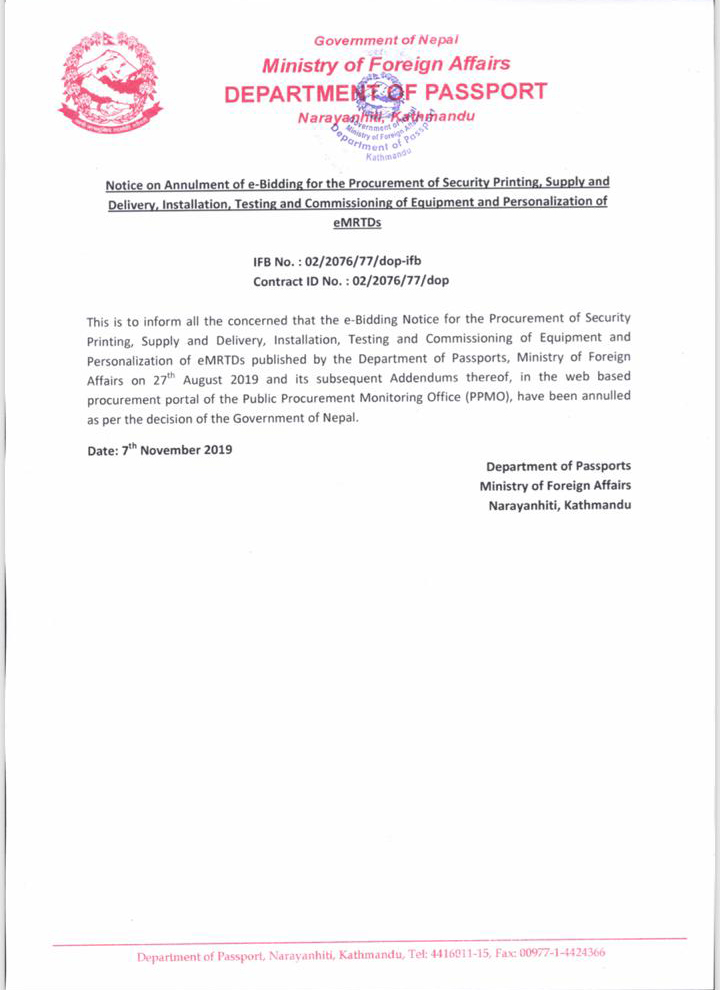National
Department of Passports cancels e-passport bid hours before the end of tender deadline
The bidding process was annulled after the direct intervention of Prime Minister KP Sharma Oli, officials say.%20(2).jpg&w=900&height=601)
Anil Giri
Hours before the extended deadline for the multi-billion-rupee e-passport tender ended, the Department of Passports on Thursday night cancelled the entire bid.
Issuing a statement, the department, late Thursday night, said that it has cancelled the e-bidding notice for the printing, supply, delivery, installation, testing, and commissioning of equipment and personalisation of electronic machine-readable travel documents.
“We do not know the reasons behind the cancellation but we have annulled the bid as per the Cabinet decision and instructions from higher authorities,” Ram Kaji Khadka, director-general of the Department of Passports, told the Post on Friday morning.
The bid has been cancelled despite the Passport Department having just 800,000 machine-readable passports in stock, as per an agreement with provider Oberthur Technologies, a France-based company.
[Read: Asian firms oppose e-passport bid process, saying conditions favour American and European companies]
On August 27, the department had issued a global tender for the printing and supply of 5 million e-passports for five years on a competitive basis that would cost the state around Rs 8 to 10 billion.
The deadline for the supply and printing of e-passport was extended twice due to complaints from prospective bidders, who said the tender did not provide a level-playing field for all.
More than 18 international firms had expressed interest and many of them were set to submit tender documents on Friday. The Department of Passports was supposed to open the bid on Friday afternoon after last extending the deadline on October 31 by a week.

According to officials, the current stock of machine-readable passports will last at the most until May and the government has no immediate measures to address the demand, which is expected to surge in the coming months in the wake of job openings in Malaysia and Japan.
Multiple officials the Post spoke to said that they had no idea why the bid was cancelled at the last moment.
At least three officials from the Prime Minister’s Office, Foreign Ministry and Ministry of Communication and Information Technology told the Post that the bid was cancelled after the direct intervention of Prime Minister KP Sharma Oli.
On Wednesday, Oli summoned Foreign Minister Pradeep Gyawali and Foreign Secretary Shankar Das Bairagi to discuss the recent boundary row with India, including the Kalapani issue.
“In that meeting, the prime minister communicated that the e-passport tender will be cancelled and that a new arrangement will be made after the installation of security printing,” an official told the Post on condition of anonymity as he was not allowed to speak to the media.
Though the government has planned to set up its own security printing facility, it is expected to take at least two years before it can start printing e-passports.
The official said the prime minister was increasingly unhappy over not getting support from officials in his bid to establish the security printing facility.
Nepal had signed a memorandum of understanding with France to set up a dedicated printing facility, leading a French government undertaking to forward a proposal to the Nepal government. The French company, however, expressed some reservations and later withdrew after various government entities called for separate open bids for passports, stickers and bank-notes.
“We do not know what is next,” said an official at the Department of Passports. “There has been no communication from higher authorities as to why the tender was cancelled.”
This last moment cancellation has shocked prospective international bidders.
Dozens of representatives from several international firms in Asia, Europe and the US had assembled in Kathmandu for the tender. One prospective bidder, who did not wish to identify himself, told the Post that the $30,000 deposited as bond is at stake as no one knows what will happen in the wake of the cancellation.
“More importantly, this last moment cancellation has tarnished Nepal's reputation internationally,” said the bidder.




 18.12°C Kathmandu
18.12°C Kathmandu














